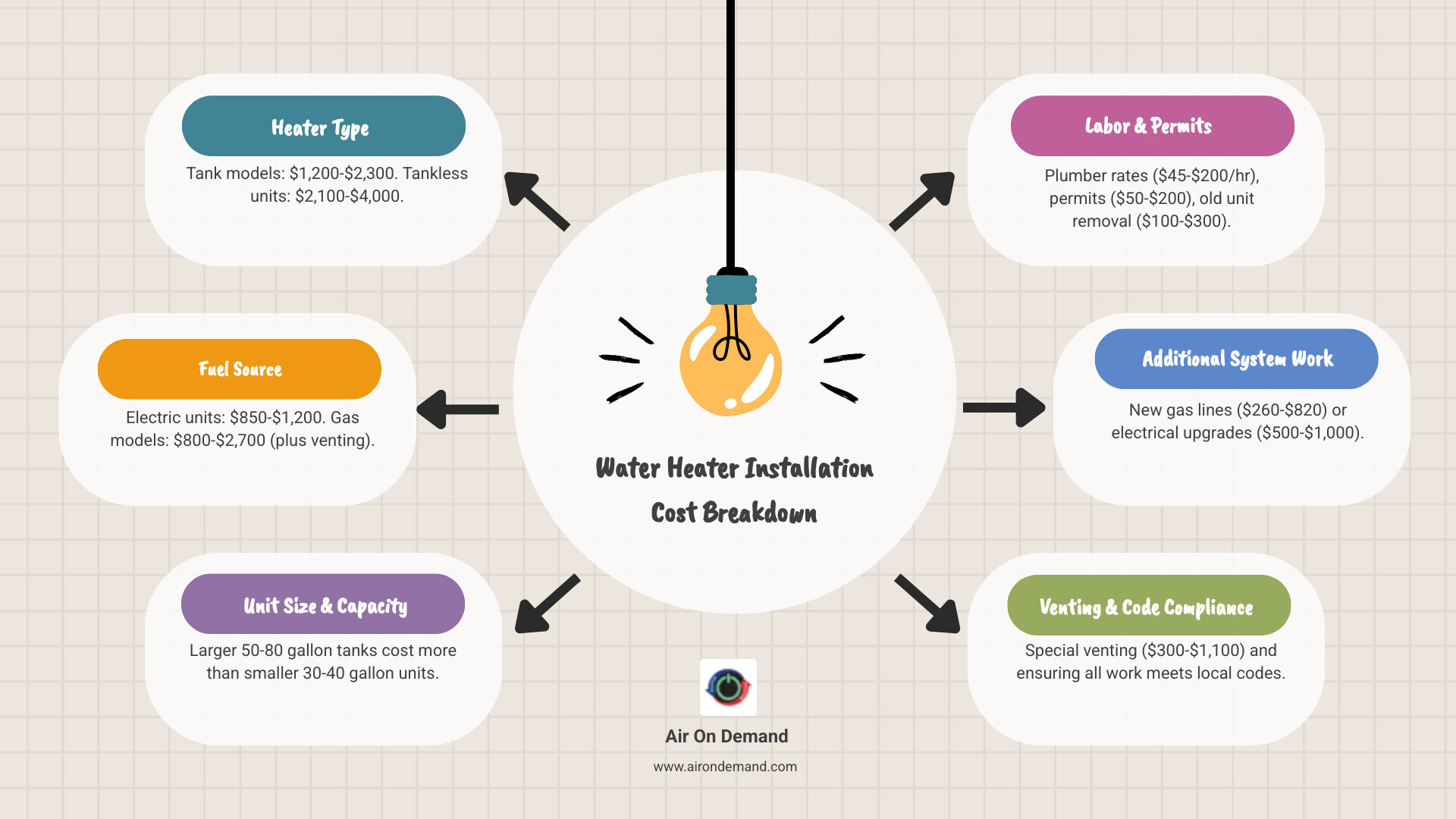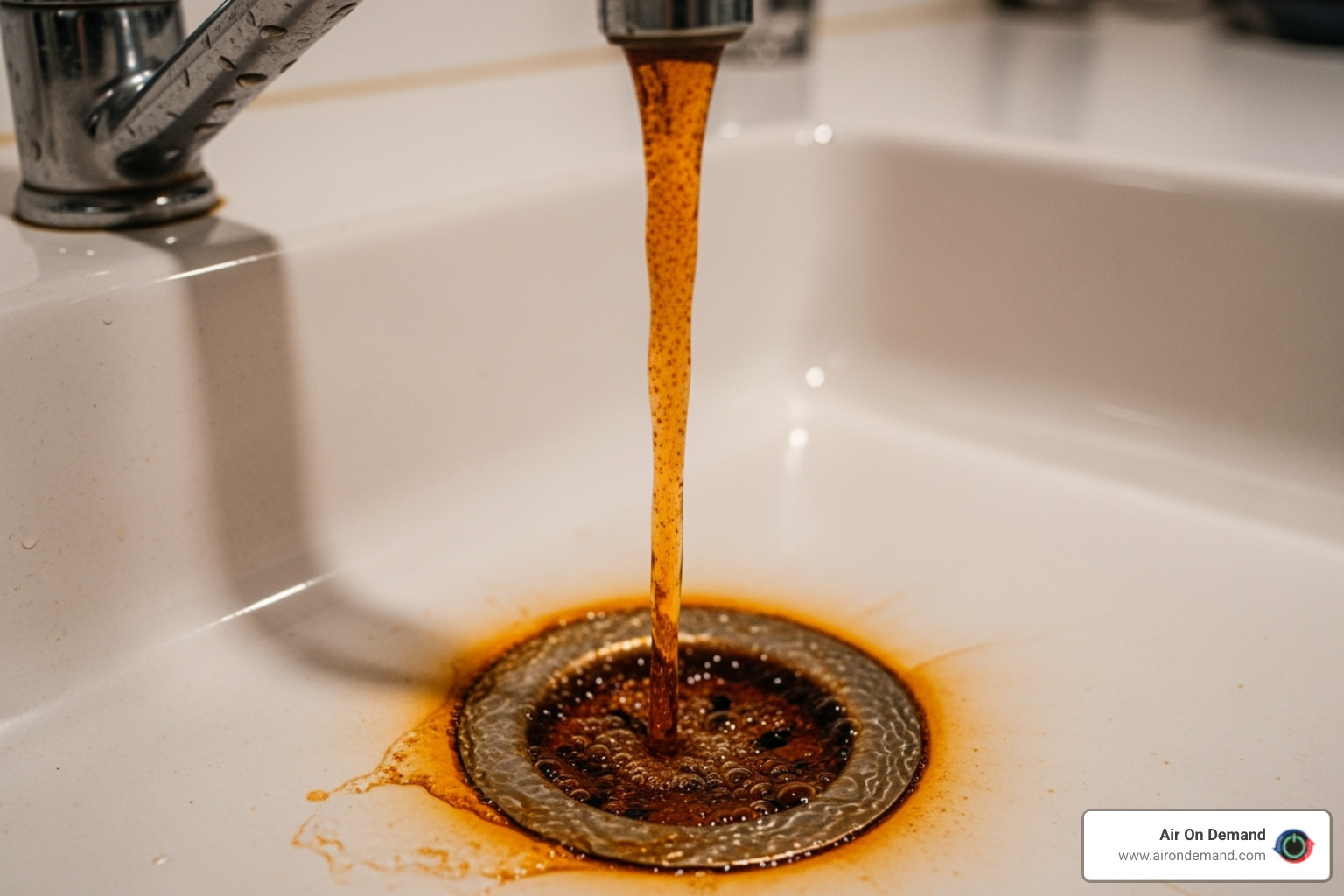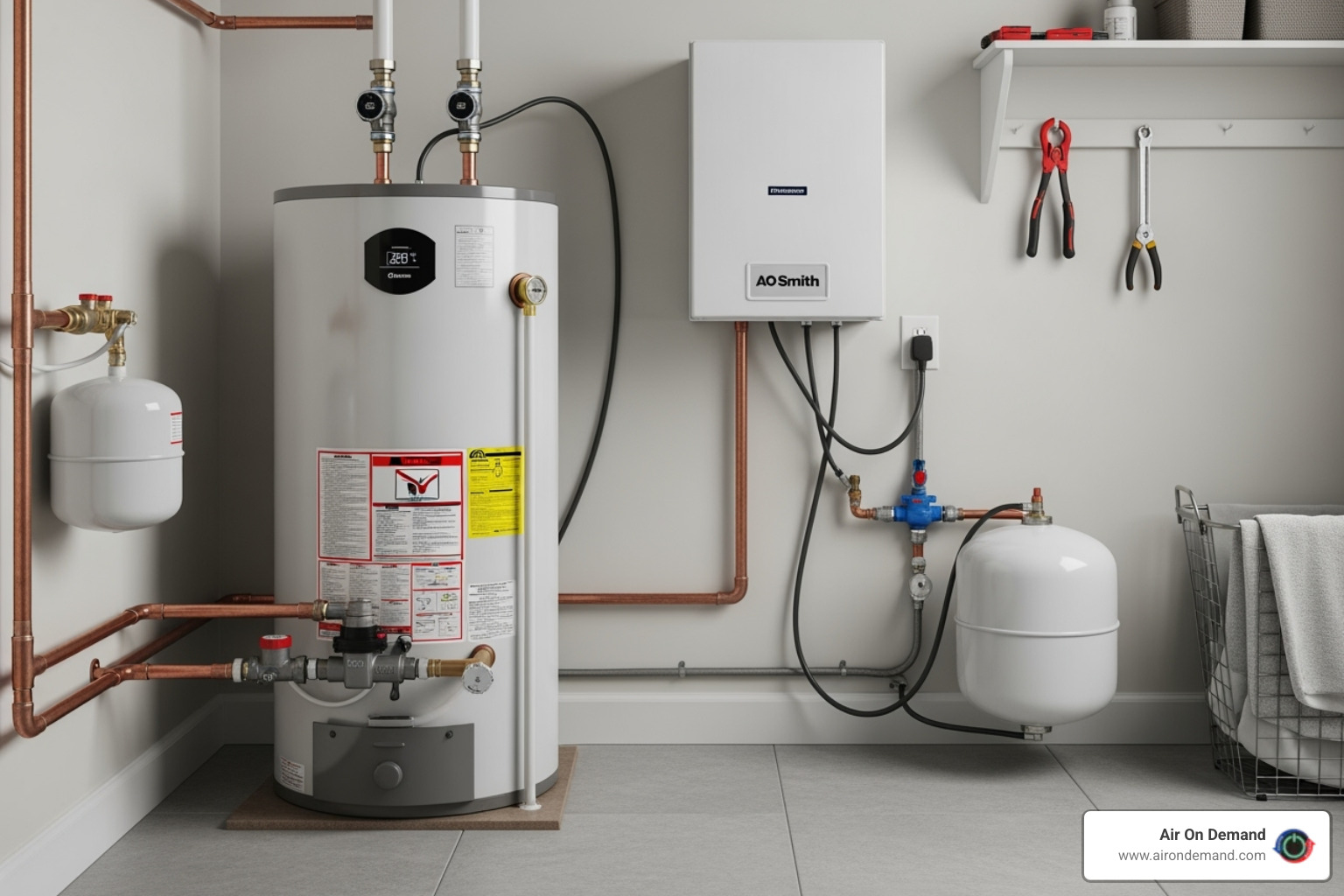Why Understanding Water Heater Installation Costs Matters
There's nothing worse than expecting a hot shower and finding only ice-cold water instead. Whether your water heater is showing its age or has already failed, you're probably wondering what it's going to take to fix the problem.
The truth is, water heater installation isn't a one-size-fits-all project. Your final investment depends on the type of heater you choose, your home's existing setup, and whether you're making any changes to your fuel source or location. Key factors include the heater type (tank vs. tankless), fuel source (gas vs. electric), tank size, and any additional work like new plumbing, electrical upgrades, or special venting.
This guide breaks down everything that affects water heater installation so you can budget confidently and avoid surprises. We'll explain the difference between tank and tankless models, compare gas versus electric options, and show you what additional expenses to expect beyond the unit itself.
By the end, you'll understand exactly what goes into the project and how to make the smartest choice for your home and budget.

Glossary for how much to install a water heater:
The Financial Picture: Factors Driving Installation Costs
Let's talk about the investment. When you're trying to figure out how much to install a water heater, you'll find that the final amount can vary significantly. These figures cover the unit itself, the labor to install it, and basic installation services—but they're just starting points.
Your actual investment can swing pretty dramatically based on where you live. Geography matters more than you might think due to regional differences in building codes and labor markets. For example, some coastal areas or regions with strict codes may see higher project scopes compared to other parts of the country.
The good news? Some regions are more budget-friendly. And if you're here in South Florida, you'll find that our corner of the country can be a favorable place for water heater installations.
Of course, the type of water heater you choose makes a huge difference too. The choice between a traditional tank or a modern tankless system, and whether you select gas or electric, will be the biggest drivers of your final bill. Standard tank models generally have different installation requirements than tankless systems, which heat water on demand. Similarly, gas-powered units involve different considerations, like venting, compared to their electric counterparts.
Understanding these baseline factors helps you plan your budget and avoid sticker shock. But remember—your specific situation might include additional work like new gas lines, electrical upgrades, or special venting, which we'll cover in the next sections.
What Factors Influence How Much to Install a Water Heater?
Understanding the various components that contribute to the final bill is key to making an informed decision. It's not just about the unit itself—many other elements factor into how much to install a water heater, from the technology you choose to where it sits in your home.

How much to install a water heater: Tank vs. Tankless
One of the first decisions you'll face is choosing between a traditional tank water heater and a modern tankless model. This choice impacts your upfront investment and long-term operating expenses.
Traditional tank water heaters keep a large reservoir of hot water ready. They often represent a lower initial investment and are straightforward to install in most homes.
Tankless water heaters heat water on demand as it flows through the unit. This can reduce energy usage by as much as 34%, which translates to real savings on your utility bills. While they may require a larger upfront investment, the efficiency gains start working in your favor immediately.
Here's something else to consider: lifespan. Traditional tank water heaters typically give you 6 to 12 years of service. Tankless models, on the other hand, can keep running for 20 years or more with proper maintenance. That extended lifespan significantly improves their long-term value. For more details, explore the Energy savings with tankless heaters. Our Water Heater Installation Guide also offers comprehensive insights.
How much to install a water heater: Gas vs. Electric
Another critical factor is the fuel source: gas or electric. Each has its own profile when it comes to investment, operating expenses, and installation complexity.
Electric water heaters are generally simpler to install. They don't require venting, which makes the installation process more straightforward—just a proper electrical connection.
Gas water heaters can be more economical to operate over time, as natural gas often has lower utility rates than electricity, though this varies by region. You can stay informed about these trends with data on Natural gas vs. electricity costs. The catch with gas models is the installation complexity, as they need proper ventilation to safely expel combustion byproducts.
Switching fuel types can be particularly involved. Moving from electric to gas requires new gas lines and a ventilation system. Switching from gas to electric might require electrical upgrades, such as a dedicated 240-volt circuit.
Size, Capacity, and Location
The physical characteristics of your water heater and its location also play a significant role.
Your household size determines the capacity you need. A couple might do well with a 30-40 gallon tank, while a family of five may need 75 gallons or more. For tankless units, sizing is based on flow rate in Gallons Per Minute (GPM). Proper sizing ensures you have enough hot water without wasting energy. To learn more, visit Sizing a new water heater.
Physical dimensions matter. Newer, more insulated units can be larger than older models of the same capacity, so you need to ensure the new unit will fit with proper clearance.
Installation location can add complexity. An attic installation involves challenging access and may require reinforced platforms and overflow drains. Garage or closet installations might need special considerations for freeze protection or ventilation to meet current codes.
Labor, Permits, and Additional Work
Beyond the unit, a portion of the investment comes from professional labor, permits, and any additional work for a safe, code-compliant installation.
Professional plumbers bring essential expertise. Most standard tank installations take a few hours, while complex tankless systems might require more time. The duration varies based on your home's infrastructure and any unexpected challenges.
In most areas, a permit is required to ensure the work meets local safety and building codes. Professional installers handle these requirements for you. For our customers in Miami, FL, we ensure all installations comply with local regulations. Learn more at Water Heater Installation in Miami, FL.
Your old unit needs to be disconnected, hauled out, and properly disposed of, a process included in professional service.
Modern building codes often require safety features like expansion tanks, earthquake strapping, and proper drainage systems. These aren't optional extras—they're essential for protecting your home.
Is It Time for a Replacement?
Nobody wants to think about their water heater until it stops working. But your water heater is probably trying to tell you something long before it gives up. Learning to recognize these warning signs can save you from a freezing shower and an emergency call.

Telltale Signs Your Water Heater is Failing
Your water heater gives you hints before it fails. The trick is knowing what to look for.
- Age: If your tank water heater is 8 to 12 years old, it's nearing the end of its expected lifespan. Tankless models often last over 20 years with proper care.
- Rusty Water: Discolored water from your hot tap indicates internal corrosion. Once this starts, a leak is often inevitable.
- Strange Noises: Rumbling or popping sounds are usually caused by sediment buildup hardening at the bottom of the tank. This forces your heater to work harder and less efficiently. Our guide on Sediment Buildup in Water Heaters explains more.
- Leaks: Even a small puddle around your water heater deserves immediate attention, as it can quickly become a major flood.
- Inconsistent Heat: Running out of hot water faster or water that isn't as hot as it used to be signals declining performance.
When you notice these signs, it's time to have a professional take a look. Catching problems early lets you plan a replacement instead of scrambling for an emergency installation.
Long-Term Savings: Energy Efficiency and Rebates
Understanding how much to install a water heater means looking beyond the initial price. A new water heater is an opportunity to reduce your monthly energy bills for years to come.
Modern ENERGY STAR® certified units can significantly cut your water heating costs. Since water heating typically accounts for a large portion of a home's energy bill, those savings add up quickly.
Tankless water heaters excel at efficiency by only heating water when you need it. Heat pump water heaters take it a step further by pulling heat from the surrounding air, using much less electricity than conventional models.
To make these upgrades more accessible, federal tax credits and local utility rebates are often available for qualifying energy-efficient water heaters. These incentives are designed to make the right choice more affordable. When you combine these programs with manufacturer offers, a premium high-efficiency model becomes much more attainable. For guidance, check out Selecting a new water heater.
DIY vs. Professional Installation: A Cost-Benefit Analysis
When looking at installation services, the DIY route can seem tempting. But water heater installation is one of those jobs where trying to cut corners can end up costing you far more in the long run.
Water heaters involve a dangerous combination of pressurized water, high-voltage electricity, and potentially explosive gas. An improperly connected gas line can lead to carbon monoxide poisoning. Faulty electrical work can cause shocks or fires. An incorrectly installed pressure relief valve can turn your water heater into a serious hazard.
Building codes exist for good reasons, and DIY installations rarely meet these requirements. This could lead to fines, rework orders, and problems with insurance claims. In fact, your homeowner's insurance might refuse to cover damage caused by an unpermitted, non-professional installation.
Furthermore, most manufacturers void their warranties if you don't use a licensed professional. That DIY job could cost you thousands if your unit fails and you find you're not covered.
Professional installers understand the nuances of different systems, know how to comply with local codes, and can spot potential problems before they become disasters. When you're dealing with gas lines and high-pressure tanks, expertise isn't a luxury—it's essential. Our team handles everything from complex Gas Water Heater Installation to straightforward tank replacements, always prioritizing safety and code compliance.
Frequently Asked Questions About Water Heater Installation
When you're trying to figure out how much to install a water heater, you probably have a dozen questions. These are the questions that come up most often.
How long does a typical water heater last?
The answer depends on the type and its maintenance history.
Traditional tank water heaters usually last between 6 and 12 years. Factors like water hardness and regular maintenance (like flushing the tank) can significantly affect longevity.
Tankless water heaters are built for the long haul, typically lasting around 10 years at a minimum and often exceeding 20 years with proper care. Their on-demand design reduces wear and tear.
Regular check-ups can help you get the most out of your investment, regardless of the model.
What does the installation process involve?
Understanding the process helps you know what to expect. Most installations follow a similar pattern.
First, we prepare the area by shutting off the water, power, or gas. For tank models, we drain the old unit. Next, we remove the old water heater and handle its proper disposal.
Then, we set up the new unit, ensuring proper clearance and connecting all water and energy lines. For gas models, this includes connecting the exhaust venting. We also install any required safety features, like expansion tanks and relief valves, which are essential for protecting your home.
Finally, we test everything thoroughly, checking for leaks and verifying correct temperature and operation. A standard tank installation typically takes a few hours, while more complex tankless systems may take several hours.
What kind of warranties come with a new water heater?
Warranties protect your investment and are a key part of evaluating the long-term value of a new water heater.
Most new water heaters come with a manufacturer's warranty that covers the tank and major components, typically for 6 to 12 years. These warranties generally protect against manufacturing defects and tank leakage.
It's important to understand parts versus labor coverage. While the unit itself is usually covered, the labor to repair or replace it might not be. Some premium models or extended packages include both.
One critical requirement is that professional installation is almost always mandatory for the warranty to be valid. A DIY installation can void the entire warranty, leaving you responsible for any future problems. This is one of the strongest arguments for using a professional from the start.
You might also have the option to purchase extended warranty coverage for additional years of protection and peace of mind.
At Air On Demand, we specialize in Daikin products, which come with impressive warranty coverage, including up to a 12-Year Parts Limited Warranty. Quality equipment and professional installation provide years of reliable hot water with solid warranty protection.
Find Your Perfect Hot Water Solution in Miami
You've made it through the numbers, comparisons, and technical details. Now you understand that how much to install a water heater is about an investment in your home's comfort and efficiency.

Armed with this knowledge, you're ready to make a smart decision. Choosing the right water heater and having it installed correctly means no more anxious mornings, surprise breakdowns, or sky-high energy bills—just reliable, efficient hot water whenever you need it.
For homeowners throughout Miami, Cutler Bay, South Miami, Palmetto Bay, Kendall, Homestead, Lake Havasu City, and Bullhead City, Air On Demand brings expertise and peace of mind to every installation. We specialize in seamless HVAC and plumbing solutions, backed by industry-leading Daikin warranties.
When you choose our professional team, you're getting safety, code compliance, warranty protection, and peak efficiency. We provide expert advice to help you select the perfect system and handle everything from start to finish, including removing your old unit.
If your current water heater is showing signs of age, don't wait. Our team is ready to help, whether you need Water Heater Repair in Miami, FL or a full replacement.
Ready to bring reliable hot water back to your home? Contact us for professional water heater replacement in Miami, FL and experience the Air On Demand difference. With convenient online booking and fast service, we make getting a new water heater as easy as it should be.





